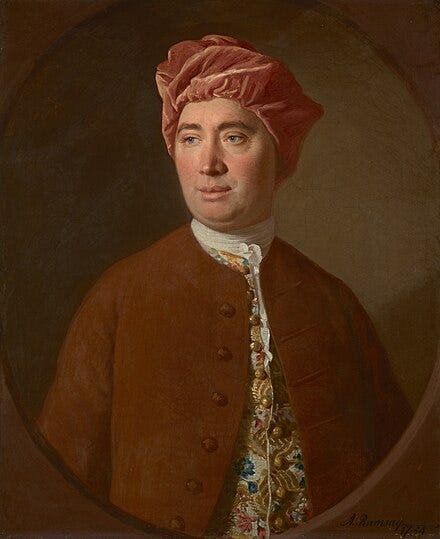Sacred Probabilities Part II: Artificial Intelligence and “the Miraculous Calculator”
Last week, in the first installment of this essay we examined the application of probability analysis to the existence or non-existence of God with reference to Pascal’s Wager. This week, in part two, we will examine a more exotic application of probability theory to theological questions.
We will examine, in particular, Bayesian theory – named for the 18th century mathematician Thomas Bayes who invented it. While it is well-known that Bayesian theory now lies at the heart of modern probability theory, and thus is foundational for modern statistical theory, computer science, and even artificial intelligence, here we examine the curious, and surprising fact that Bayes actually created his theory to disprove David Hume’s arguments against miracles.
David Hume by Allan Ramsay (1754)
The Preacher Who Used Math to Defend Christianity
Some time in the 1740s or 1750s a Presbyterian minister by the name of Thomas Bayes sketched out an interesting mathematical argument and put it back in his desk. It stayed in that desk until after Bayes died in 1761. In 1763, Bayes’ assistant and protégé Richard Price, a radical nonconformist minister, finally published the paper through the British Royal Society. The result has since become known as Bayes’ Theorem, and it is one of the most important findings of statistical science — indeed, as we have noted, it’s one of the core engines of contemporary Artificial Intelligence.
What is fascinating about Bayes’ Theorem, however, is that those scientists, engineers, and computer programmers that use it every day seem mostly unaware of why it was invented.
Reverend Bayes never saw himself as coming up with a tool for sophisticated engineering, rather he saw the argument that he sketched out as proof that the miracles of the Bible – especially of the New Testament – could easily have taken place. In this regard, Bayes came up with his Theorem to counter the arguments of sceptics like the Scottish philosopher David Hume. If this were not interesting enough, it should be noted that contemporary philosophers of science – even those who are not themselves religious – recognise that Bayes and Price had the better of the argument. In fact, they tore Hume’s infamous work discrediting miracles – a work that is still regularly cited today – to pieces.




